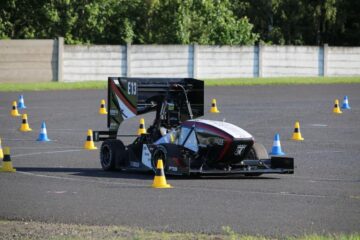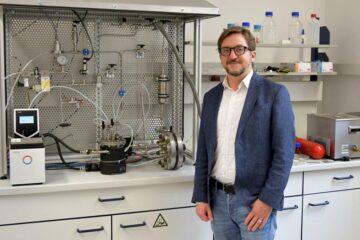Learning more about the use stage of products: their entire life span is now under investigation

Regardless whether it's a dish-washer, an airplane, a television set, or a nautical vessel – a product has a life, even after its development, manufacturing, and introduction on the market. A life among its users that lasts all the way to its recycling or ultimate disposal.
Taking into consideration the entire life cycle of a product is gaining importance more and more. Experts from research and industry therefore committed themselves to the issue of Product Lifecycle Management (PLM). The Bremer Institut für Produktion und Logistik GmbH (BIBA) at the University of Bremen has now invited PLM experts from all over the world to gather on occasion of the
„7th International Conference on Product Lifecycle Management“ (PLM10),
from the 12th to the 14th of July 2010, BIBA, Hochschulring 20, 28259 Bremen
Host of the conference is Professor Klaus-Dieter Thoben, Director of the BIBA Research Unit Application of Information and Communication Technologies in Production (IKAP) and Director of Integrated Product Development at the Department of Production Engineering at the University of Bremen.
After having been held in India, France, Italy, Korea, and England, the conference is now about to take place for the first time in Germany. „We await over 100 scientists, developers, and users from 17 countries“, says Nils Homburg, the BIBA researcher who is responsible for the organisation of the „PLM10“.
„Over 70 lectures will be concerned with all fields of PLM research and development and document the state of the art of this research topic. Strongly represented are subjects dealing with knowledge and information management as well as the organisation of cross-company collaboration,“ says Homburg. Also obvious is the great and increasing interest in intelligent products and sustainability.
The applications and the significance of PLM in practical life stand in the focus of the „PLM10“. For example, in his opening lecture, Andreas Weber from the BMW Group will be concerned with the question on how PLM supports the German automobile industry also in periods of crisis. Based on examples, he will talk about PLM applications which manage both product complexity and process innovations in the BMW Group with PLM.
Theoretical background and numerous figures are provided by Professor Michael Abramovic from the Ruhr University in Bochum. Abramovic is recognised as one of the leading PLM experts and will present the results of the study “Advantages of PLM”, which has been conducted in the German automobile industry for the third time in 2009. He will also report about exemplary strategies and their implementation. The main emphasis of the „PLM10“ is by no means limited to the automobile industry. „The subject of PLM has concerned almost all branches and sectors of the economy for a long time,“ says Homburg. This is also revealed by the agenda of the „PLM10“ conference.
The use stage of products moves more into focus, and hence the customer
„PLM designates a strategic concept to manage a product over its entire life cycle,“ explains Thoben. „It comprises supportive IT systems as well as methods, processes, and structures. PLM is therefore not to be conceived as a closed system or a purchasable IT solution, but as a procedure which implements adequate technical and organisational measures with company specificity.“
Even if the expression of PLM suggests a continuous view over the whole lifecycle of a product, previous main issues primarily considered the early stages of a product’s life span, which means planning, development, and manufacture. „Nowadays the subsequent stages, particularly the use stage involving the customer, but also waste disposal and recycling, is moving more into the focus of the manufacturers,“ says Thoben, and that there is still a lack of information on how products are being used. „Consequently, a large part of the value chain has only poorly been taken into consideration in the past.“
„In the future, it will be important not only to manufacture products, but to look at their entire lifecycle in all environments. Information and communication technologies play a central role in this regard,“ knows IKAP director Thoben. „PLM looks at products, companies, and production processes as a whole. It assumes an extended definition of product and manufacturer, and this requires, among other things, consistent flows of information. We need comprehensive data from all life stages of a product and new forms of collaboration. This will enable us to create intelligent products which will satisfy both economical and ecological requirements of the future.“
Contacts:
Professor Klaus Dieter Thoben (BIBA, Director of the Research Unit Application of Information and Communication Technologies in Production – IKAP)
Phone: +49 (0)421 218-55 12, E-mail: tho@biba.uni-bremen.de
Nils Homburg (BIBA, „PLM10“ Project Supervisor)
Phone: +49 (0)421 218-55 42, E-mail: hom@biba.uni-bremen.de
Media Contact
Alle Nachrichten aus der Kategorie: Veranstaltungsnachrichten
Neueste Beiträge

Ideen für die Zukunft
TU Berlin präsentiert sich vom 22. bis 26. April 2024 mit neun Projekten auf der Hannover Messe 2024. Die HANNOVER MESSE gilt als die Weltleitmesse der Industrie. Ihr diesjähriger Schwerpunkt…

Peptide auf interstellarem Eis
Dass einfache Peptide auf kosmischen Staubkörnern entstehen können, wurde vom Forschungsteam um Dr. Serge Krasnokutski vom Astrophysikalischen Labor des Max-Planck-Instituts für Astronomie an der Universität Jena bereits gezeigt. Bisher ging…

Wasserstoff-Produktion in der heimischen Garage
Forschungsteam der Frankfurt UAS entwickelt Prototyp für Privathaushalte: Förderzusage vom Land Hessen für 2. Projektphase. Wasserstoff als Energieträger der Zukunft ist nicht frei verfügbar, sondern muss aufwendig hergestellt werden. Das…





















